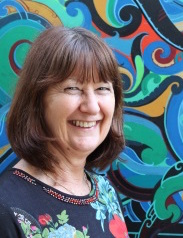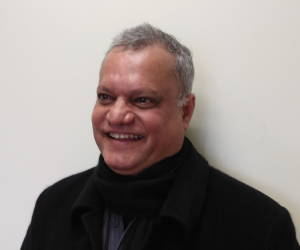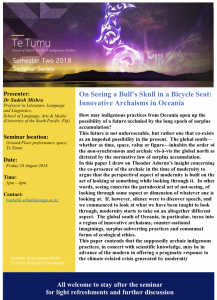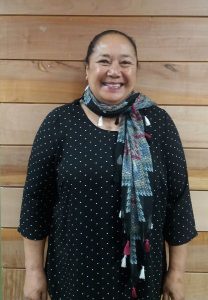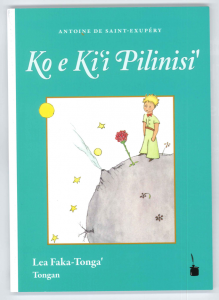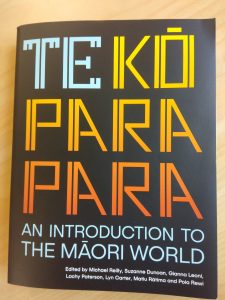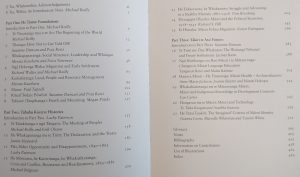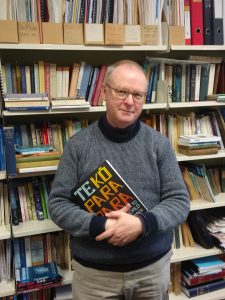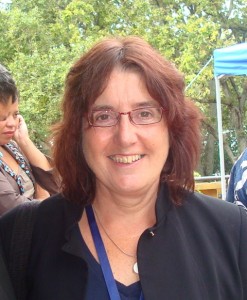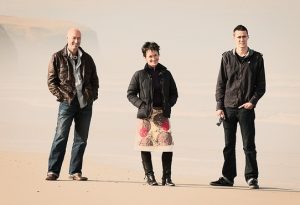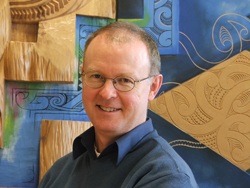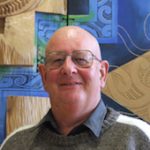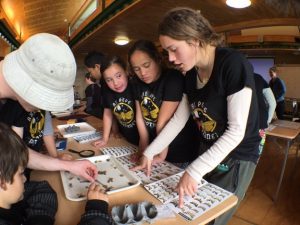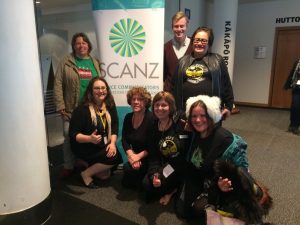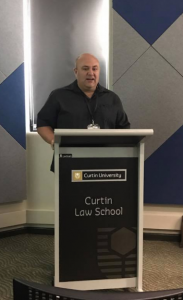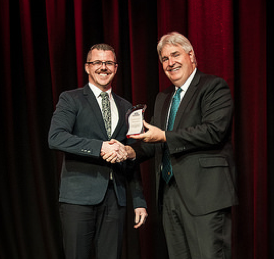10 questions with . . . Lyn Carter.
The Association of Social Anthropologists of Aotearoa/New Zealand recently conducted a ’10 questions with’ session with Te Tumu’s Lyn Carter about her newly released book Indigenous Pacific Approaches to Climate Change: Aotearoa/New Zealand on their blogsite. Click here to read all about it.
New book: Indigenous Pacific Approaches to Climate Change
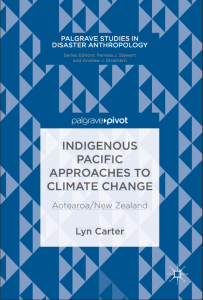 Climate Change is an issue for the Pacific. We are delighted to announce the lastest book by a Te Tumu scholar, Dr Lyn Carter, Indigenous Pacific Approaches to Climate Change, published as part of Palgrave’s Studies in Disaster Anthropology Series.
Climate Change is an issue for the Pacific. We are delighted to announce the lastest book by a Te Tumu scholar, Dr Lyn Carter, Indigenous Pacific Approaches to Climate Change, published as part of Palgrave’s Studies in Disaster Anthropology Series.
Dr Carter, a Ngāi Tahu scholar, is a member of Te Tumu’s Indigenous Development programme, and teaches the popular INDV301 course, Māori and Indigenous Development Ethics and Government.
From the publisher: “Situating Māori Ecological Knowledge (MEK) within traditional environmental knowledge (TEK) frameworks, this book recognizes that indigenous ecological knowledge contributes to our understanding of how we live in our world (our world views), and in turn, how we adapt to climate change.
“As an industrialized nation, Aotearoa/New Zealand (A/NZ) has responsibilities and obligations to other Pacific dwellers, including its indigenous populations. In this context, Lyn Carter discusses how A/NZ can benefit from the wider Pacific strategies already in place; how to meet its global obligations to reducing greenhouse gases; and how A/NZ can utilize MEK to achieve substantial inroads into long-term adaptation strategies and sustainable practices. Carter demonstrates that in all respects Māori tribal groups are well-placed to be key players: adaptation strategies, policies, and practices are integrated throughout Māori/Iwi traditional knowledge.”
Click here to access this new book.
Sudesh Mishra seminar
Te Tumu is honoured to be hosting Professor Sudesh Mishra from the University of the South Pacific, Fiji, who is in Dunedin for the next six weeks on the Ratu Sir Kamisese Mara Fellowship. He is a noted poet and literary critic, but his research is now taking new directions, in particular looking at Indigenous responses to modern ecological crises, such as climate change.
He will be giving a lecture in the Te Tumu Seminar Series at 3pm on 24 August on the Ground Floor of Te Tumu, entitled “On Seeing a Bull’s Skull in a Bicycle Seat: Innovative Archaisms in Oceania.” More details in the poster below. Please feel free to come along, and circulate this blog post to anyone who might be interested.
Talitali fiefia, to our new Pasifika lecturer
Mālō e lelei. Te Tumu is very pleased to introduce our new lecturer, Dr. Telesia Kalavite, who has just joined our staff. Telesia will be teaching in the Pacific Islands Studies programme, as well as in the Indigenous Development programme.
Dr Kalavite is a professional Tongan educator who has taught in Tonga, Fiji, New Zealand and Australia at primary, secondary and tertiary institutions for many years. Her tertiary education working experiences were at Tonga Institute of Education, Waikato Institute of Technology, The University of Waikato, The University of Southern Queensland and now The University of Otago. Her qualifications include: Teachers’ Certificates (TC), a Diploma in Education (DipEd), a Bachelor of Arts (BA), a Postgraduate Certificate in Education (PGCertEd), a Master of Education (MEd), a Postgraduate Diploma in Educational Leadership (PGDipEDL), and a Doctor of Philosophy (PhD). Whilst in the teaching profession Telesia worked for the development of her own Tongan people as well as Pacific peoples’ communities. She is a passionate community person who actively participated in many youth, church, university, community groups and non-government organisations.
She believes in grassroots development to alleviate the harsh conditions of disadvantage. Her passion and research interest are in Pacific and indigenous educational development worldwide in particular New Zealand, Australia and the Pacific region.
Dr Kalavite is also a noted translator of works between the English and Tongan languages. One of her most recent works is Ko e Ki’i Pilinisi’, a translation of Antoine de Saint-Exupery’s famous novella, Le Petit Prince (The Little Prince). We are excited that she will be offering an introductory Tongan language paper in Summer School next year.
We are delighted to welcome Telesia, and her husband Sione, to Te Tumu, and to Dunedin.
In all good bookstores soon!
Ka tangi the kōparapara! Te Tumu staff are delighted with the advance copy of their new book, Te Kōparapara: An Introduction to the Māori World, which arrived a few days ago. This book, published by Auckland University Press, will be out in bookstores next month. Te Tumu will use it as a textbook for our MAOR102: Māori Society paper, replacing Ki Te Whaiao, which staff put out in 2004. But Te Kōparapara will also be of interest to anyone wanting to learn more about te ao Māori.
The kōparapara is the bellbird, the most impressive native songbird, and its tangi is used as a metaphor for the twenty-one chapters in the book. There are three sections. “Te Tumu: Foundations” looks at pre-contact history and Māori culture both from a traditional standpoint, but also in the present. The second section, “Tāhuhu Kōrero: Histories” examines the past from Māori first contacts with Pākehā newcomers to the post-war urban migrations. This leads into “Tākiri the Ata: Futures” which looks at contemporary Māori society and its future. See the contents pages for fuller details. Also click the AUP webpage to access some sample pages.
A number of Te Tumu staff, past and present, have contributed to the book: Michael Reilly, Suzanne Duncan, Poia Rewi, Merata Kawharu, Erica Newman, Paul Tapsell, Megan Pōtiki, Lachy Paterson, Karyn Paringātai, Tangiwai Rewi, Matiu Rātima, Lyn Carter, our postdoc, Gianna Leoni, and former postgrad students Marcelle Wharerau and Tawini White.
We would also like to send out a big mihi to the other authors who also contributed chapters, including from Otago: Richard Walter (Anthropology), Erik Olssen (History, emeritus), Janine Hayward (Politics), Tom Brooking (History), Jacinta Ruru (Law), Anne-Marie Jackson and Hauiti Hakopa (PE), Joanne Baxter (Health); and from further afield, Michael Belgrave (Massey), Richard S. Hill (Victoria), Te Taka Keegan (Waikato) and Acushla Sciascia (AUT). And of course, Sam Elworthy and the team at Auckland University Press.
In particular, we must acknowledge Professor Michael Reilly who led the project, ably assisted by Suzanne Duncan and Gianna Leoni, wrangling all the contributors (and co-editors), communicating with the publisher, and making sure all the little tasks were completed. He mihi nui ki a koe, Michael; mei kore ake koe hei hautū i te kaupapa nei.
Te Tumu Graduates in May 2017
Eight Te Tumu students graduated in the May ceremonies last weekend.
Hine Te Ariki Parata-Walker (Ngāti Porou, Ngāi Tahu) completed a Master of Indigenous Studies (MIndS). Her research topic, supervised by Professor Paul Tapsell, investigated procedures around hahunga (the exhumation of ancestral remains) in modern times. Select Parata-Walker abstract for further details.
Karurangi Salu (Tainui, Ngāpuhi, Samoan) gained a BA(Hons) with her research, entitled “Māku anō tōku nei whare e hanga”, looked at how haka and waiata are used in teaching at Te Whare Kura o Rākaumanga to pass on Tainui history, reo, tikanga and whakapapa. Dr Karyn Paringātai supervised. Select Salu abstract for further details.
Rieko Hayakawa also graduated with a PhD in Pacific Islands Studies.
Congratulations also to our BA graduates.
Alice Anderson (Ngāi Tahu), BA in Indigenous Development/Te Kura Matanui.
Luaipouamalo Gafa (Samoan), BA in Pacific Islands Studies.
Maiora Puketapu-Dentice (Te Āti Awa, Tūhoe), BA in Māori Studies and History.
Tataioterangi Reedy (Ngāti Porou, Te Whānau a Apanui), BA in Indigenous Development/Te Kura Matanui.
Roma Simmons-Donaldson (Ngāti Porou, Taranaki, Tainui, Ngāti Tūwharetoa), BA in Māori Studies.
Rangahau Roundup
Semester 2 has been busy on the research front for Te Tumu staff and postgrads.
Te Tumu is still progressing with Te Kōparapara, a book on Māori culture, history and contemporary society, which is designed as a textbook for MAOR102 as well as for a general audience. Prof Michael Reilly is the main driver of this project, and has been ably assisted by Dr Gianna Leoni. This book, with an array of essays mainly written by Te Tumu staff, is under contract with Auckland University Press and should appear sometime in 2017.
Faculty News
Associate Prof Jenny Bryant-Tokalau has been having a busy Research and Study Leave. She has given two presentations in the USA in the last semester: ‘Food security and other risks in a time of climate change: traditional and contemporary forms of resilience’, to the Department of Anthropology, and ‘Small Island Pacific States: Dealing with Climate Change’ to the Department of Geology at Wheaton College in Massachusetts. In December she presented ‘Working in Context: The Commercial Potential of Customary Pacific Land’ at the Aotearoa New Zealand International Development Studies Network Ninth Biennial Conference ‘Pacific Currents, Global Tides’ Wellington, and ‘Dealing with disasters and social change’ to the Asia Pacific Biocultural Health ‘Big Ideas’ Workshop, in Dunedin, December.
Jenny has also had one chapter in an edited collection appear during this period: ‘Community responses to floods in Fiji: lessons learned’ In Calabrese, John (ed.) Humanitarian Assistance and Disaster Response: Rising to the Challenge. MAP Series, Middle East Institute, Washington. August (2016) issue. Click here to access it. She also has two book reviews published in New Zealand and Pacific Studies November, 2016; and Journal of the Polynesian Society 125 (1), 2016.
Jenny is planning to return to the Solomon Islands to carry out in-depth interviews on small and medium businesses on Kastom land, as well as to finalise book edits for Palgrave MacMillan Anthropology of Disaster Series: What the Pacific Islands can teach New Zealand about Climate Change.
As previous posted, Prof Paul Tapsell spoke at the Indigenous Plenary at the WAC-8 Conference in September. Paul and Associate Prof Merata Kawharu are also part of the large three-year Mauri-Whenua-Ora project within the National Science Challenge Land and Water: Toitū te Whenua, Toiora te Wai. This project is the only fully Māori-led and Māori-integrated research programmes of all NSCs nationally, and is looking at Maori land and water based innovation including: (1) micro economy development “Pa to Plate”, (2) Shared iwi innovation for Taitokerau as a model for other iwi and (3) a regional (Te Hiku) study looking at Maori land suitable use and value chains. Merata also has a forthcoming publication, “Indigenous Entrepreneurship: Cultural Coding and the Transformation of Ngāti Whātua in New Zealand” in the Journal of the Polynesian Society, 125, 4 (2016): 385-408.
Associate Prof Lachy Paterson gave a presentation entitled ‘U.S. Slave “Humor” in New Zealand Newspapers’ at the 109th Annual Meeting of the Pacific Coast Branch of the American Historical Association at Waikoloa, Hawai’i. He is currently writing up this paper, which looked at how imported racist discourses permeated New Zealand’s English-language newspapers. Lachy returned to his ongoing obsession with Māori-language newspapers, with “The New Zealand Government’s Niupepa and their Demise” published in the New Zealand Journal of History, 50, 2 (2016): 44-67.
Together with Associate Prof Angela Wanhalla (Dept of History and Art History), he has also sent off their manuscript “He Reo Wahine: Māori Women’s Voices from the Nineteenth Century” to Auckland University Press, and it should appear sometime in 2017.
Over summer Prof Michael Reilly hopes to write a paper concerning the research relationship between William Wyatt Gill of the London Missionary Society, and Mamae of Ngāti Vara, a church minister, on Mangaia during the 19th century. In the longer run, he wants to begin writing chapters for an introduction to Māori tribal history, drawing from the draft text used as a ‘course reader’ in MAOR 207 Ngā Kōrero Nehe – Tribal Histories. Michael is passionate about this project but acknowledges that it may take several years to finish. He has also completed the final editorial corrections for a paper to be published this December, “Narrative Features and Cultural Motifs in a Cautionary Tradition from Mangaia (Cook Islands)”, in the Journal of the Polynesian Society 125, 4 (2016): 357-384.
Dr Jim Williams has a forthcoming article in the Journal of the Polynesian Society, entitled “Seafood Gardens”. Jim has a busy summer planned, fininishing off an essay for Ethnohistory, entitled “Layers of History” explaining how certain activities are repeated at powerful places, giving rise to notions of circularity of time, but layered, like whakapapa; he will also be giving a presentation in January at the American Historical Association conference in Denver. One of Jim’s students, Katrina Bryant, has just completed her Master of Physiotherapy.
In October newly graduated Dr Gianna Leoni gained a new position based in Te Tumu, that of a Ngā Pae o te Māramatanga postdoctoral fellow, with the research project “Te Ōhanga o te Pīpīwharauroa – Expressing our Economic Aspirations”. Click here for more details.
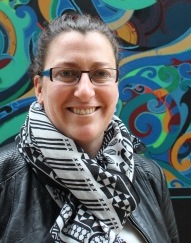 In June, Megan Pōtiki presented on her doctoral research on language loss at Ōtākou, at He Rau Tumu Kōrero IX at Te Rau Aroha Marae in Bluff. This event was run by Te Pouhere Kōrero, the national Māori historians organisation. Megan has also published two journal articles, “The Otago Peninsula: A unique identity” in Shima, 10, 1 (2016): 67-84 [Potiki-Shima-v10n1-3]; and ‘Te Haka Nā Ngā Herehere’ in Te Pouhere Kōrero 8 (2016): 6 –25, and is currently working on another article, “Māori song composition and reclamation of traditional tribal borders” based on a mōteatea she composed for the Te Tumu Kapa Haka group.
In June, Megan Pōtiki presented on her doctoral research on language loss at Ōtākou, at He Rau Tumu Kōrero IX at Te Rau Aroha Marae in Bluff. This event was run by Te Pouhere Kōrero, the national Māori historians organisation. Megan has also published two journal articles, “The Otago Peninsula: A unique identity” in Shima, 10, 1 (2016): 67-84 [Potiki-Shima-v10n1-3]; and ‘Te Haka Nā Ngā Herehere’ in Te Pouhere Kōrero 8 (2016): 6 –25, and is currently working on another article, “Māori song composition and reclamation of traditional tribal borders” based on a mōteatea she composed for the Te Tumu Kapa Haka group.
As part of Māori language week this year Tangiwai Rewi was asked to give a Library research floor talk on Wednesday 13 July on the Ngāruawāhia Turangawaewae regatta, which comes out of her doctoral research and an article last year in the Journal of the Polynesian Society. A display themed around the article was shown in the Hocken Collections for seven weeks as part of Māori language Week. Click here for more details and pictures.
Tangiwai has participated in the Ahi Pepe Resource launch 27 October and Wānanga 26-28 October. She was a collaborator in this project which created an immersion te reo Māori Moths resource depicting the 600+ species endemic to the South Island. Twelve schools were invited to the Wānanga, to participate, learn how to trap, kill and present moths for identification and preservation. Also launched that night were the bilingual and total immersion resource covering the four areas of the South Island.
Tangiwai also attended the SCANZ (Science Communicators Association NZ) conference on 14 November as part of the panel who discussed the resource and preservation of moths.
Tangiwai went north to attend the Te Awamārahi poukai on 24 November. (Poukai are ceremonial gatherings held on Kīngitanga marae.) This was an opportunity to take the photo display back to her marae especially as some of people featured in the photos come from that marae. The photo boards were put on display along with other harakeke resources found along the riverbanks. Needless to say, Tangiwai also vigorously promoted Te Tumu and the University of Otago to all the people who came to view the display.
Postgraduate News
Congratulations to Matangi Schaaf who graduates in December with a PhD; and also to Nikki Walden (Taranaki, Te Āti Awa) and Nurul Sultan with Master of Indigenous Studies degrees. Click here for more details.
Two of our PhD students are submitting in December: John Birnie and Taomi Qiliho-Tapu, and Tāwini White (Ngāi Tahu, Te Rarawa) is making the final amendments to her MA thesis. Rieko Hayakawa‘s PhD thesis ‘Possibility of Telecommunication Universal Service in the Pacific Islands; Case studies of Vanuatu, PEACESAT and USPNet’ has just passed examination. We look forward to these students graduating in the near future.
We have a new PhD student who has just started, Raaniera Te Whata (Ngāpuhi, Ngāti Porou, te Whānau a Apanui), researching communities-based Māori land development in the Bay of Islands. Raaniera comes into doctoral studies after completing an LLB in Auckland and a Master of Indigenous Studies in Te Tumu.
In August Erica Newman who is undertaking PhD research on Fijian Orphanages (1874-1970) presented at the Anthropology and Archaeology Postgraduate Symposium held here in Dunedin.
Matiu Payne (Ngāi Tahu, Ngāti Mutunga), who is researching the impact of government agencies on tikanga whāngai for his doctoral studies, has just been to the Australia New Zealand Law and History Society conference at Curtin University in Perth presenting on his PhD research.
Kelli Te Maihāroa (Waitaha) who is researching Māori peace traditions and their relevance to whānau today, has co-edited an edited collection: H. Devere, K. Te Maihāroa, & J.P. Synott (eds.) Peacebuilding and the Rights of Indigenous Peoples: Experiences and Strategies for the 21st Century, (Springer: Cham, Switzerland, 2016), which includes two co-written and one sole-authored articles by Kelli. She also has an article forthcoming, “Whanaungatanga: Relationships in a One Day Te Reo Māori School of Excellence” in Theobald, M. (Ed.) Friendships in Multilingual Settings (Sociological Studies of Children and Youth, Vol 21 (2016)). Emerald. Kelli, who is a lecturer in the College of Education, also presented at the Teacher Education Forum of Aotearoa New Zealand, in June/July in Dunedin, and at International Indigenous Research Conference in November in Auckland.
Three Items
The Puke Ariki Trust Scholarship, valued at $5000, supports the studies of a postgraduate student whose research relates to Taranaki’s social history. Puke Ariki is Taranaki’s Museum, Library, Archive Centre based in New Plymouth, renowned for its extensive heritage collections. If you are interested in this scholarship, check out the Puke Ariki Trust Scholarship Terms and Conditions.
Associate Professor Jenny Bryant-Tokalau presented a paper to the conference ‘Islands and Oceans: Navigating Pacific Futures’ held at Auckland University, November 12-13th 2015. Jenny’s paper, entitled ‘Reforming Land Tenure in the Pacific: requirements and implications, the case of Fiji’, was chaired by former Oxfam director Barry Coates, and was part of an intensive two day workshop between University of Auckland (Pacific Studies), Auckland University of Technology, Australian National University and the University of Otago to look at areas of collaborative Pacific research.
Te Tumu PhD student Nathan Albury recently was awarded the Griffith University School of Language and Linguistics Outstanding Alumnus Award in recognition of his PhD research into folk linguistics for Te Reo Maori and Sami language. Nathan is completing his PhD at the Centre for Multilingualism in Society Across the lifespan – MultiLing (CoE), Department of Linguistics and Scandavian Studies, University of Oslo,with Dr Lyn Carter (Te Tumu) as one of the supervisors.
Better than Australians?
Nathan Albury suggests that Pākehā have embraced the Māori language better than white Australians have supported their indigenous languages. In an opinion piece for SBS Nathan makes this claims.
But the Australians have done so little to protect their languages, it’s not hard being better than them in this regard. And te reo Māori still needs everyone’s support. Me āwhi tonu te reo Māori, me tautoko, me kōrero.
Nathan is at Oslo University, but is supervised by Te Tumu’s Lyn Carter.
Seminar: The Folk Linguistics of Māori Language Revitalisation
Nathan Albury, PhD student, will be giving a seminar in Te Tumu on 2.30-3.30pm, Tuesday 18 November in R3S10 (3rd floor, Te Tumu). Please note that this is a different day and venue to usual.
Nathan’s paper, The Folk Linguistics of Māori Language Revitalisation, “applies the folk linguistics of language policy in respect to language revitalisation as a policy project. It reports preliminary findings from research that sought to compare what young indigenous and non-indigenous youth in contemporary New Zealand claim to know about language revitalisation as a policy process, what attitudes and beliefs these youth have towards activities and themes aimed at revitalising the Māori language, and how their knowledge and beliefs manifest into folk linguistic performance when these youth are positioned as hypothetical language policy bosses of the New Zealand government.”
For the full abstract click here, or on the “Seminars” page on the left

